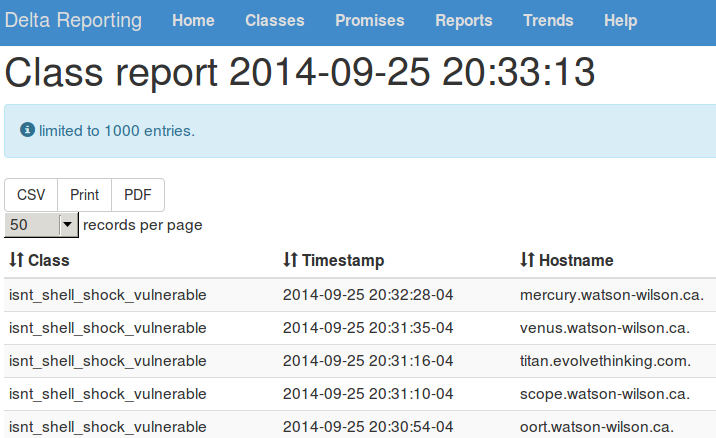Shellshock free with CFEngine and Delta Reporting

Above is a screenshot from Evolve's production Delta Reporting service. These hosts are safe from Shell shock. Thanks to Delta Reporting, EFL, and CFEngine our journey to a safe harbour was not long. First we had to design a test for the vulnerability.
Fortunately there is already a test described; a single shell command. Because we use EFL there was no need to write new CFEngine policy for the test or the fix. EFL's ready to use policy bundles take parameter files and for this test only two parameters were needed for the bundle efl_classes_cmd_regcmp.
This is a bundle that defines classes by comparing the output of a command with a given regular expression. The user defines if the match should be positive or negative. That is if a match, set a given class, or without a match set a given class. We used both:
efl_classes_cmd_regcmp parameters
linux ;; is_shell_shock_vulnerable ;; no ;; /usr/bin/env x='() { :;}; echo vulnerable' bash -c "echo this is a test" ;; useshell ;; (?ims).*?vulnerable.* ;; security
linux ;; isnt_shell_shock_vulnerable ;; yes ;; /usr/bin/env x='() { :;}; echo vulnerable' bash -c "echo this is a test" ;; useshell ;; (?ims).*?vulnerable.* ;; security
The lines here a broken with '\' for easier reading. The true parameter file has no line breaks for each entry. The first line sets the class is_shell_shock_vulnerable if the command's return matches the regular expression. The second line sets the class isnt_shell_shock_vulnerable if the command's return does not match the regular expression. The match or not match is controlled by the yes/no column, which means use 'not' in the class expression rather than the standard 'expression'. Thus, the first line is no, use expression, and the second is yes use 'not'. Once this policy is out to the clients one of those two classes will be set and Delta Reporting will collect and record them. Now on to the fix.
Package promises are seldom easy in CFEngine. The more exacting you make the promise, like specifying always upgrade to the latest or install a given version, the less reliable the promise is. This is not solely a CFEngine problem. Package managers are notoriously inconsistent in their behaviour. In CFEngine 3.6 this will improve. However, our production is still using CFEngine 3.5.2 so we had to use the hammer approach of a commands promise to be certain. Fortunately EFL has a commands bundle, so we can simply write a parameter and not a promise.
efl_command parameter
debian ;; /usr/bin/apt-get -y install bash ;; yes ;; no ;; 240 ;; security
Above the apt-get command is run on every debian host, in a shell, once every 240 minutes. We'll take this out after a few days, but in the mean time any new bash fixes will be applied when they are ready.
There you have it. With just three lines of code we were able to use our existing CFEngine infrastructure, powered by EFL and Delta Reporting, to quickly patch our hosts.
